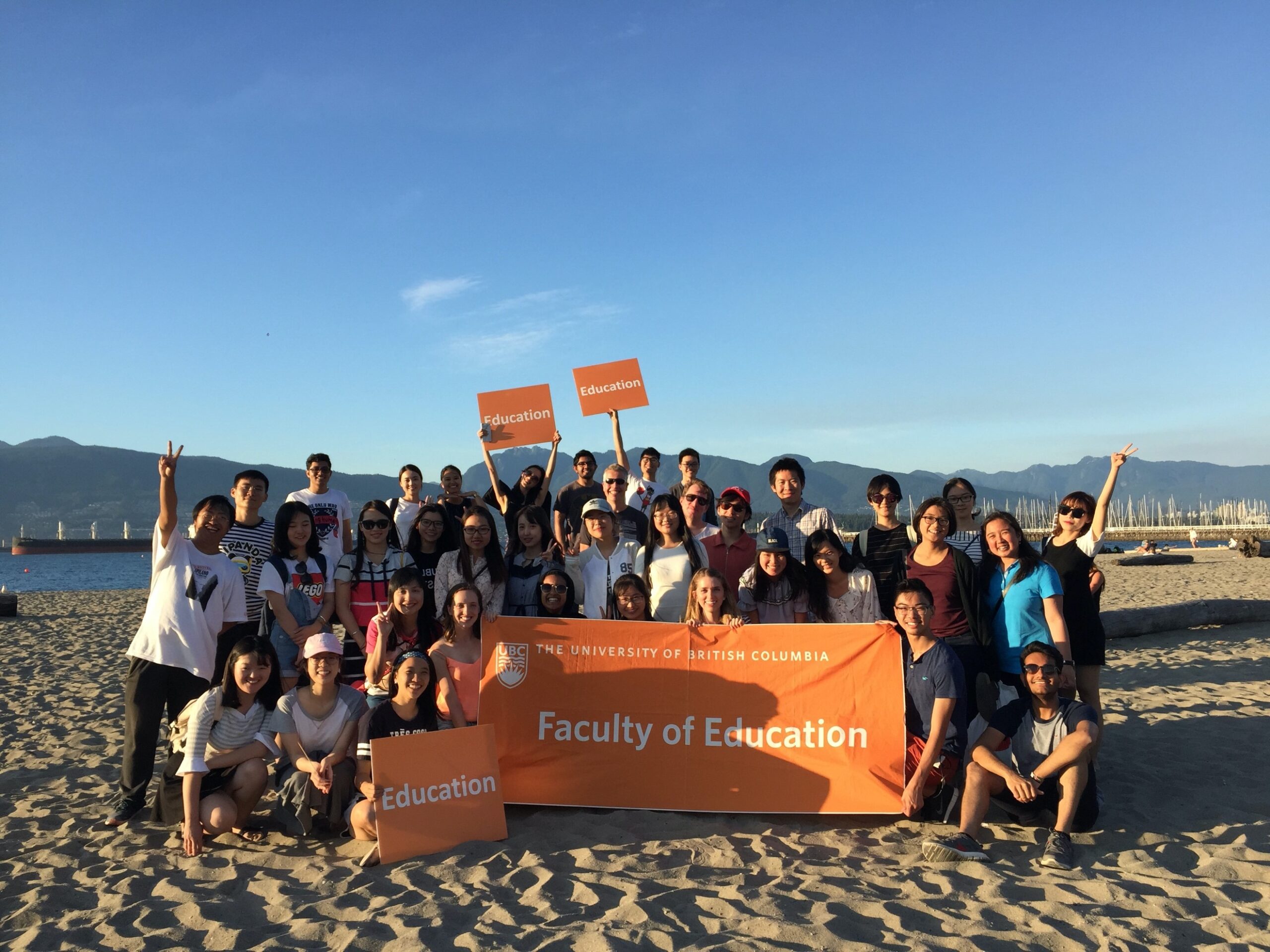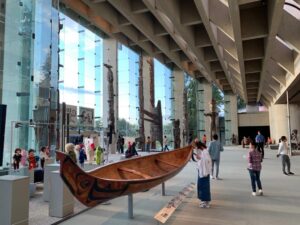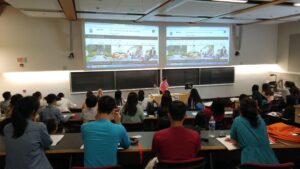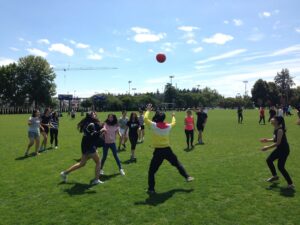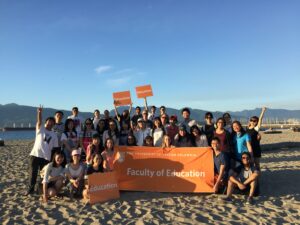The Faculty of Education at the University of British Columbia, top-ranked in Canada and 9th in the world, has served the international education community through leadership in research, teaching, and service for over 50 years.
What you might expect/course format
The UBC Vancouver Summer Program in the Faculty of Education is a four-week program developed for international undergraduate students. The courses deliver academic rigour through pedagogies selected to optimize learning of students with diverse cultural and linguistic backgrounds. The program provides the opportunity for students to learn about a wide range of education topics in a Canadian context, while also exploring Canadian society and culture through engaging classes, field trips, and social activities. It is a truly holistic learning experience!
- Each package consists of two courses (approximately 39 hours of class time per course)
- Classes are interactive and often include discussions, group work, and field trips
- Evaluation may include assignments, group projects, papers, and presentations
- Out-of-the-classroom activities extend learning opportunities and help build international networks of colleagues and friends
- Students’ home universities can receive detailed information about the courses and records of students’ achievement and may grant academic credit for the courses at their own discretion
July 2025 Course Packages
Applied Linguistics for Teachers
An introduction to additional language learning and teaching, from the perspective of applied linguistics, this course will assist teachers of English as an additional language in making linguistically informed decisions about their practice. The course design is grounded in the understanding that today’s language classrooms are diverse multilingual and multicultural places, presenting students and teachers with unique challenges. Therefore, successful language teachers need to understand more than just the structure and nature of the language(s) they teach: they also need to develop an understanding of the social, cultural, and ideological implications of language and language education.
Introduction to Teaching and Learning English
By focusing on the practice of English language teaching, this course aims to provide participants with a comprehensive view of fundamentals that guide instructional practices in a variety of contexts. This course design is grounded in the understanding that to be an effective language teacher, one needs to familiarize with a range of instructional models, teaching techniques, assessment strategies, and sociocultural concerns, as they pertain to teaching English in the globalized world. Specifically, this course gives participants an insight into innovative ways to promote communicative competence though integration of language skills and will prepare them for lesson and unit planning. Topics to be discussed include: overview of teaching methods, curriculum and planning for instruction, initiating and sustaining interaction in the classroom, classroom management, among others.
Prerequisites: No prerequisites
Minors (students aged under 19 at the start of the program): Not Accepted
Creativity, Innovation, Critical-Thinking and Problem Solving in STEM Education
Creative approaches to STEM education are essential in 21st century classrooms as they encourage innovation, critical thinking, and problem-solving in ways that traditional methods often cannot. By integrating hands-on activities, real-world applications, and interdisciplinary learning, the teachers will not only make STEM subjects more engaging but also better prepare students for the demands of a rapidly evolving world. Moreover, the incorporation of educational technology, such as smartphone-based experiments and digital simulations, enables personalized and adaptive learning, bridging the gap between theory and practice and supporting all STEM students. This course will explore educational research that examines these technology-based practices and invite the participants to experience and design evidence-based and effective STEM teaching strategies to ensure enhanced student outcomes for their own students. The course will support teachers in adopting innovative methods that foster deep understanding and long-term interest in STEM fields, equipping students with the skills necessary for future careers in science and technology.
Engaging Students with STEM Inside and Outside of the Classroom
This course focuses on creative approaches to STEM education beyond classroom walls, emphasizing the importance of applying theoretical knowledge in real-world contexts. Engaging students in outdoor and informal learning environments—such as parks, museums, and local communities—not only deepens their understanding of STEM concepts but also fosters greater engagement and retention. Through hands-on, inquiry-based activities, students are encouraged to explore, experiment, and solve problems, which in turn nurtures critical thinking and curiosity. This course will inspire educators to incorporate these dynamic learning settings into their teaching, helping students build essential skills of collaboration, communication, and adaptability that are key to success in both STEM careers and everyday life. Additionally, outdoor STEM learning fosters a sense of environmental stewardship and empowers students to tackle global scientific challenges of climate change and conservation efforts, making their learning even more relevant and impactful. Through filed-trips and situated learning activities participants will experience and practice effective approaches to STEM education outside of the classroom.
Prerequisites: No prerequisites
Minors (students aged under 19 at the start of the program): Not Accepted
Understanding the Social-Emotional Learning Needs of Diverse Learners in School, Family, and Community Contexts
School, family, and community systems have a particularly strong impact on overall development including social-emotional health and wellness as well as learning. In this course, the notion that children and youth live, learn, and play in multiple systems is addressed. All of these environments impact social and emotional health and wellness, and in turn learning. The students taking this course will be exposed to school, family, and community factors that impact social-emotional health/wellness and learning. The ways in which social-emotional health and wellness impact learning both directly and indirectly is critically examined. Given students in the course are learners from diverse international contexts, cross-cultural perspectives on these considerations are also explored.
Culturally Responsive Approaches to Creating Positive Learning Environments to Support Social-Emotional Health/Wellness
Addressing the social-emotional health and wellness of children and youth in society today is critical to academic learning. Knowing effective ways to address the social and emotional health and well-being of learners in the early through young adult years is a focus of this course. Students in the course will be exposed to a wide variety of programs to support the social and emotional health and well-being of students along with approaches that promote student learning. Programs that explore learner support in school, family, and community settings will be explored and critically reviewed by the students in the course. This will include the ways these programs are (or are not) culturally responsive to learner strengths and needs and why a culturally responsive approach is important is examined through project-based learning.
Prerequisites: No prerequisites
Minors (students aged under 19 at the start of the program): Not Accepted
For more information
For VSP Education-specific questions, email Fang Wang, Director of International Initiatives, at fang.wang@ubc.ca.
Student testimonials
– Liyan, VSP Education Student
– Pablo, VSP Education Student
